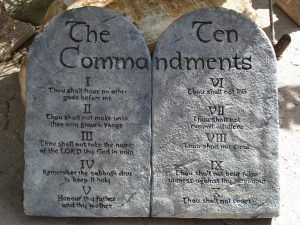to be perfectly ruled and perfectly free
The question, and concomitant debate and controversy, of whether God exists or as Richard Dawkins and others so adamantly assert is merely a delusion, is unlikely to be resolved to everyone’s satisfaction anytime in the near or far distant future. As someone who resides firmly on the side of God, I must admit to holding certain views that may and often do conflict with those who sit on the opposite side of the proverbial fence. While I quite often may stridently disagree with my worthy opponents on this matter, I hold no animus toward anyone who may happen to disagree with me and I hope and trust that the feeling may be mutual.

God’s Law
Since the very beginning[1] it has been obvious that human beings have an insatiable appetite for doing whatever they want, when they want, how they want, and unfortunately, more often than not let the consequences fall where they may. There is a certain argument to be made that “What we want, Heaven help us, is simultaneously to be perfectly ruled and perfectly free, that is, at the same time to discover the right and the good and to create it.”[2] What ought to be apparent from this is that these two contradictory impulses together form a paradox that goes beyond “some high abstract level of arcane angst.” This paradox presents us with a conundrum of the highest order: where to locate an unjudged judge, an unruled legislator, a premise maker who rests on no premises, an uncreated creator of values.
Arthur Allen Leff argues:
“There is then, this one longstanding, widely accepted ethical and legal system that is based upon the edicts of an unchallengeable creator of the right and the good, in which the only job of the person who would do right is to find what the evaluator said. Assuming that I know what the command ‘Thou shalt not commit adultery’ means, then if (and only if) the speaker is God, I ought not commit adultery. I ought not because He said I ought not, and why He said that is none of my business. And it is none of my business because it is a premise of His system that what He says I ought not to do, I ought not to do.
It is of the utmost importance to see why a God-grounded system has no analogues. Either God exists or He does not, but if He does not, nothing and no one else can take His place. Anything that took His place would also be Him…We are defined, constituted, as beings whose adultery is wrong, bad, unlawful. Thus committing adultery in such a system is ‘naturally’ bad only because the system is supernaturally constituted.”>[3]
There is much more to Leff’s argument but what has been presented here ought to be sufficient for us to begin to realize that the aforementioned paradox can and does exist only when the supernatural laws of God are ignored or supplanted by the laws instituted by man. Certainly something to ponder and consider, don’t you think?
[1] Here I will leave the how, what, and when of the beginning to one’s own interpretation, although I personally am partial to Genesis, Chapters 1 & 2.
[2] Arthur Allen Leff, Southmayd Professor of Law, Yale Law School, “Unspeakable Ethics, Unnatural Law”, Duke Law Journal, Vol 1979, No. 6, pp. 1229-1249.
[3] Ibid.
